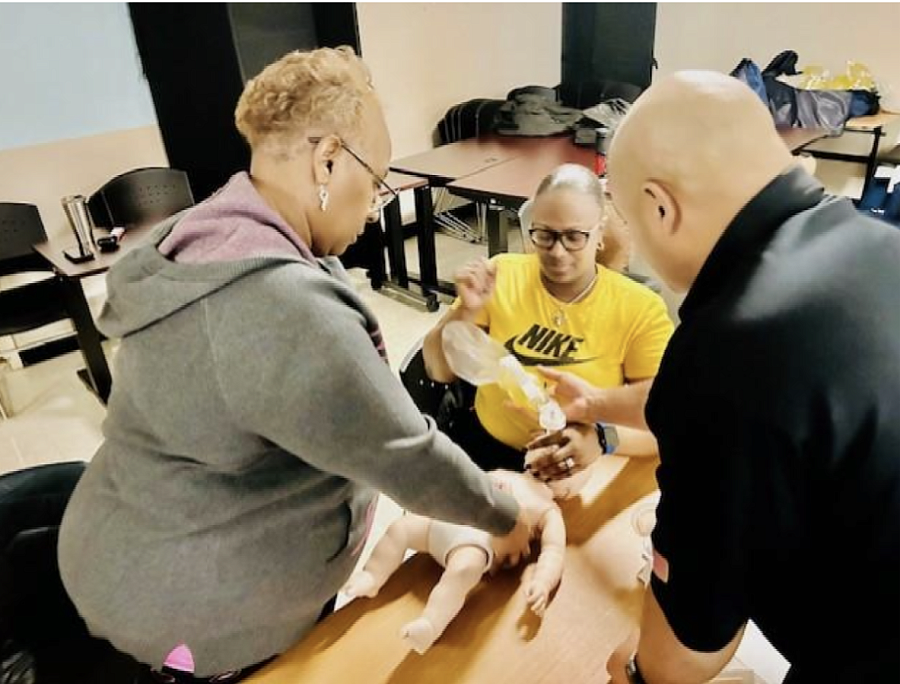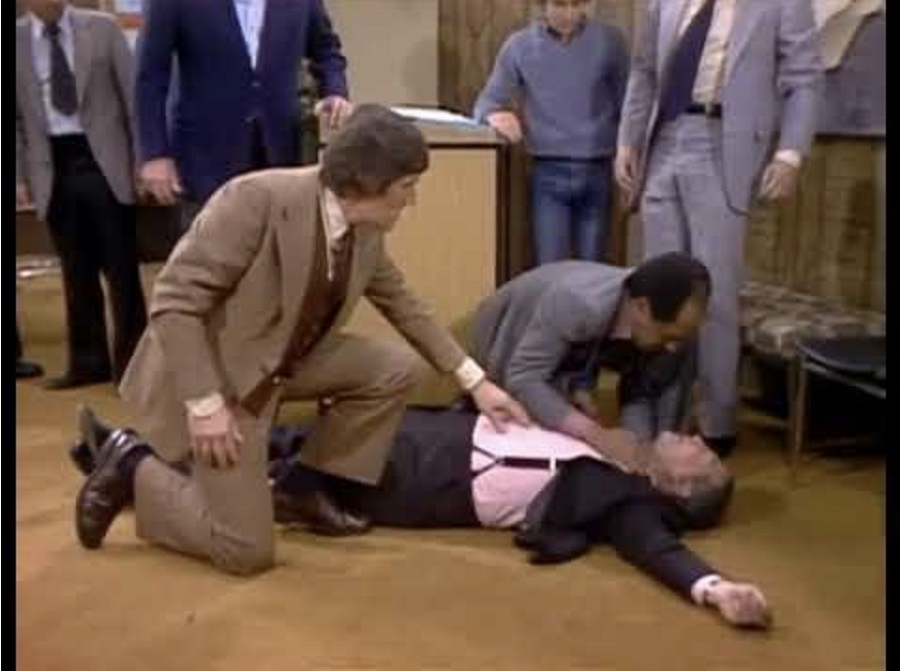The Health Divide: Blacks and Hispanics who go into cardiac arrest in public are less likely to receive CPR than whites

Lt. Moses Butler, a Milwaukee firefighter who teaches CPR classes, wants to help more people who are Black and Hispanic learn to perform life-saving CPR.
(Photo via James Causey)
In December, I took a refresher cardiopulmonary resuscitation course because I realized a lot has changed since I last went through infant CPR training in 2003, the year my daughter was born.
Children’s Hospital of Wisconsin required Taylor’s mom and I to take CPR before we took our daughter home because she was born 13 weeks premature. We took a 35-minute course in infant CPR, and all I can say is thank God we never had to use it. The thought of using two-finger compressions on my daughter’s chest would have been frightening.
My last full CPR certification course was in 2000, and since then, the international CPR guidelines have been modified three times. I was rusty, and I felt if someone required CPR, I would have been more comfortable calling for help than attempting to perform the lifesaving measures myself.
I procrastinated on retaking CPR until I came across a 2022 study that said Black or Hispanic adults who go into cardiac arrest in public are less likely than their white peers to receive CPR from a bystander.
The research found that 60% of whites received bystander CPR when cardiac arrests happened in public locations compared to 45% of Blacks and Hispanics, according to the study in the New England Journal of Medicine.
“Racial and ethnic differences in bystander CPR in public locations raise additional concerns about implicit and explicit biases in layperson response to out-of-hospital cardiac arrests,” the researchers wrote.
Several first responders in my CPR class were not surprised by the differences in the study.
“It’s the main reason more African Americans and minorities need to know how to perform CPR. When people feel comfortable knowing how to do it, they are more likely to use it when needed,” said Lt. Moses Butler, a Milwaukee Firefighter for 20 years who led the free five-hour training.
CPR training is primarily hands-on
The CPR course was primarily hands-on and packed with information.
“While it may seem like we are giving you a lot of information, the most important thing is not to be afraid to step in and perform chest compressions. That alone can help save someone’s life,” Butler told the class of 12, all African Americans.
I’ve been in a position where I did not feel comfortable performing CPR.
That event happened eight years ago at a National Association of Black Journalists convention. I was at the awards ceremony when a woman ran into the gala and asked if anyone knew how to perform CPR. In a room of about 500 people, only five people stood up. My wife and I were two of the five.
When we got to the man, he was unconscious on his back in the middle of the hallway. Two people tried to wake him up by shaking his shoulders. I called for 9-1-1, and a woman in a full-length ball gown knelt by his side and felt his neck, looking for a pulse.
Of the five of us, only one woman felt confident enough to start CPR.
This lasted five minutes before EMS arrived, but it felt much longer.
By the time paramedics arrived, the woman was soaked in sweat, but her efforts saved his life. For the record, the person suffering from cardiac arrest was white, and the woman who saved him was Black.
I vowed to take a refresher CPR course after that, but I never got around to it until I saw a free class offered by the Milwaukee Fire Department and The Prince Hall Grand Lodge Free Masons of Wisconsin.
Tracey Dent, a Mason and community activist who spearheaded the free training event, said more people of color must learn CPR because African Americans experience sudden cardiac arrest at twice the rate of whites.
“We hosted an event several months ago, and several people required medical help, and no one knew what to do. We called 9-1-1, but nobody knew CPR, and at least one person needed it,” he said.
The news that Blacks and other minorities are less likely to receive CPR from a stranger than a white person was disturbing.
“People are people, and I hope that no matter what the situation is, Black, White, Asian or a child, I would hope after today the people here would feel confident enough to help a person needing help,” he said.
Study: Blacks and Hispanics less likely to receive bystander CPR
If you suffer a cardiac arrest and you are in public, there is a good chance you will depend on a bystander to respond. Without them providing some form of CPR, your chances of surviving before first responders and paramedics arrive are substantially lower, Butler said.
According to the study “Racial and Ethnic Differences in Bystander CPR Witnessed Cardiac Arrest,” data from the National Cardiac Arrest Registry identified 110,054 people in the U.S. who had cardiac arrests outside of a hospital setting between 2013 and 2019.
The research found that 45.6% of Blacks and Hispanics received bystander CPR when cardiac arrests happened in public locations compared with 60% of Whites.
But the main question is why?
While taking Saturday’s CPR course, there was nothing to indicate whether race should play a factor in attempting CPR on a needy person.

Temporal Trends in Bystanders CPR for Persons with Out-of-Hospital Cardiac Arrest, 2013 through 2019.
Source: Racial and Ethnic Differences in Bystanders CPR for Witnessed Cardiac Arrest, NEJM, Oct. 27, 2022
In 1981, ‘The Jeffersons’ showed the racism tied to bystander CPR
I remember watching a 1981 episode from “The Jeffersons” sitcom. George Jefferson, who is Black, accidentally attends a meeting in his high-rise building that he wrongly assumed was talking about crime in the building. It turned out the meeting was an attempt to recruit members of the Ku Klux Klan.

In the sitcom the Jeffersons, about a Black family, George Jefferson gives CPR to his racist neighbor and saves his life. His neighbor, a member of the KKK, says after seeing who his rescuer is: "You should've let me die."
The KKK leader goes on a racist rant before he suddenly grabs his shoulder and collapses. George steps in, instructs someone to get help and starts CPR.
When the KKK leader discovers that a Black man saved his life, he looks over at George and says to his son, “You should’ve let me die.”
When I heard the statistics of bystander CPR, I thought about this scene. Butler remembered the episode, too.
Butler, who is Black, said you can’t ignore the racial component.
Still, he also believes it comes down to many Blacks and Hispanics not knowing CPR or being comfortable performing the life-saving measure.
During his career, Butler has performed CPR on people suffering from cardiac arrest more than 200 times. He has saved dozens of lives.
“You may say, why didn’t you save more people? Well, the simple answer is because it's usually too late by the time we get there,” he said.
“If we get more minorities to learn CPR, we can help to turn around those numbers,” Butler said.

